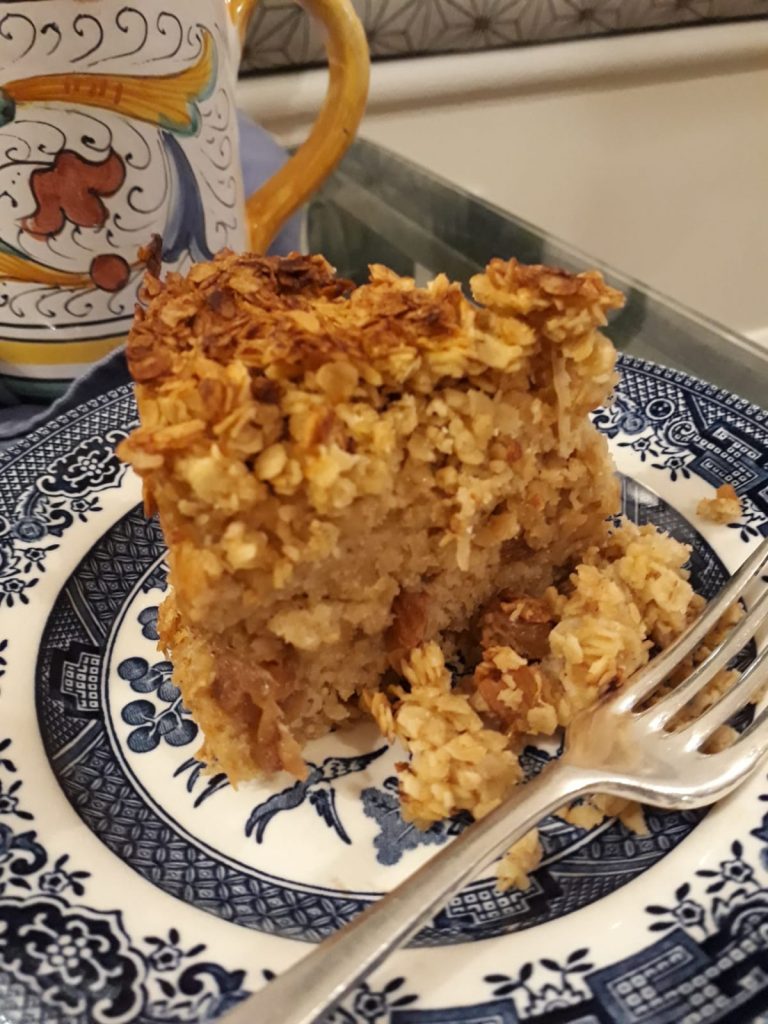These are like a cross between a cake and a flapjack and are great for lunchboxes if you feel the need to put baked treats in. You can also eat them warm, topped with a dollop of natural coconut yoghurt or (for dairy) Greek sheep’s yoghurt with a few drops of vanilla extract stirred in. For these, I adapted Theodora Fitzgibbon’s apple flakemeal layer cake recipe into a traybake and swapped butter for virgin coconut oil.
Makes 16 squares
For unusual ingredients, see “larder & shopping”.
325g cooking apples
1 rounded tsp ground cinnamon
A generous pinch of nutmeg, if you have it
30g raisins
50g virgin coconut oil (or butter, if you eat dairy)
1½ rounded tbs rounded tbs honey
1 rounded dsp blackstrap molasses
175g gluten-free porridge oats (or normal if you eat gluten)
Grated rind of an organic lemon (if you cant get organic, scrub in hot water before using)
Juice ½ lemon
1 egg
- Turn on the oven to 180C (165C fan).
- Line a 20-20cm baking tray or brownie tin with greased baking paper.
- In a large saucepan on a very low heat gently melt the honey, molasses and coconut oil. A tip for getting the honey or molasses easily off the spoon is to heat the spoon first in a jug of boiling water.
- Meanwhile chop the raisins, peel and grate the apples and mix everything together with the lemon juice and rind. The antioxidants in the lemon prevent the apples turning brown. When the oil and honey mixture is melted, add the oats, cinnamon, nutmeg, apple mixture to the saucepan and mix to combine. Finally, beat the egg, add in and mix lightly.
- Turn the mixture into the prepared tin, even out and smooth down with a knife or spatula and bake, checking after about 20 minutes. It should take around 30 minutes and be only very slightly browned on top and at the edges. It will still be moist and a little springy to the touch.
Why this recipe is better for you:
Virgin coconut oil is a healthy oil rich in medium chain triglycerides that help increase energy levels in your body and brain rather than being stored as fat in your body. Cooking apples are a very rich source of pectin, which binds to toxic materials in the bowel until they can be eliminated safely. Both apples and oats contain soluble fibre which nourishes beneficial bacteria in the gut. Beneficial bacteria help support immunity, clear skin and regulate bowel function. Honey, molasses and almost all other sweeteners are still high in natural sugars so if you want the ideal diet, aim not to eat them more than a couple of times a week. For transitioning from a high sugar to a low sugar diet though, these are ideal. Molasses is high in iron and chromium so it does have some benefits as well as its lovely toffee flavour. Stevia is the only exception to this as it contains no sugars at all and is 100% healthy.

